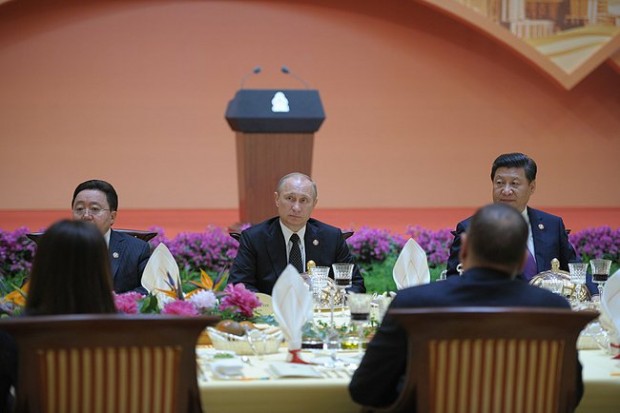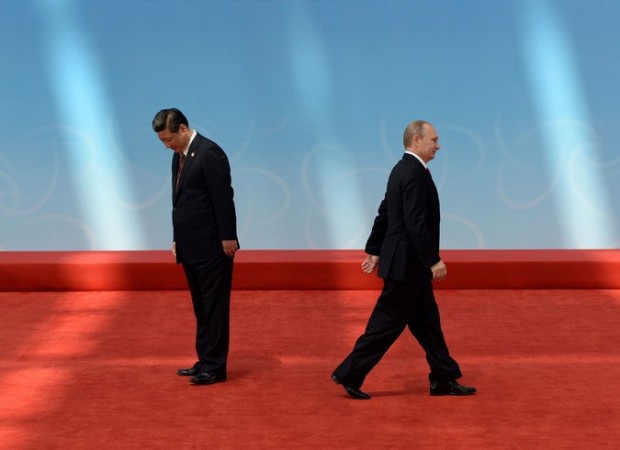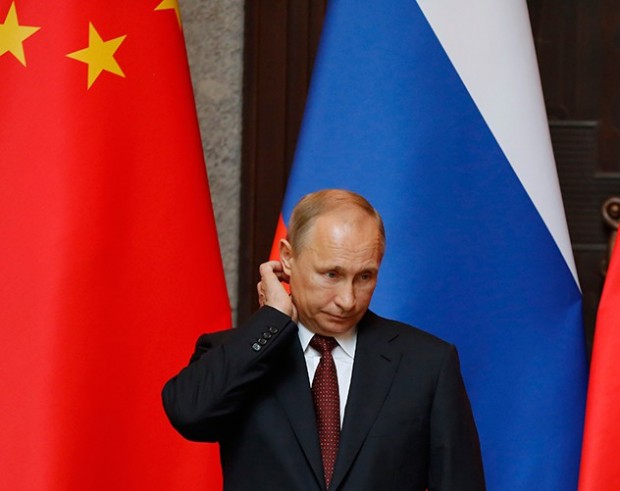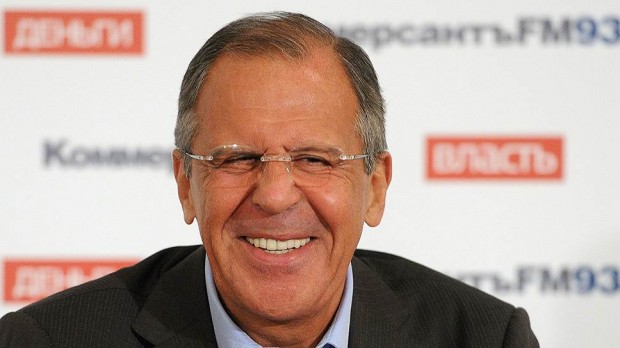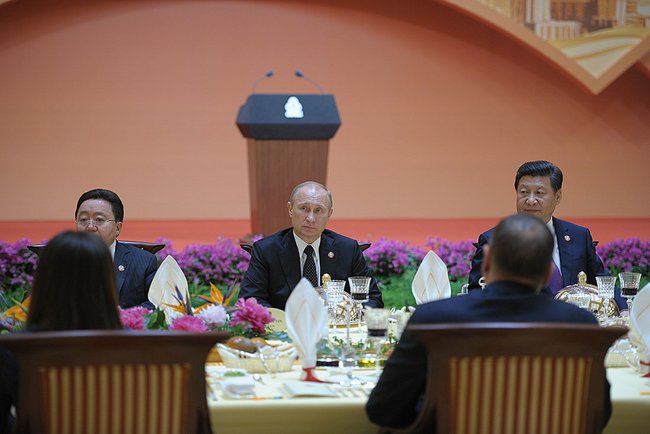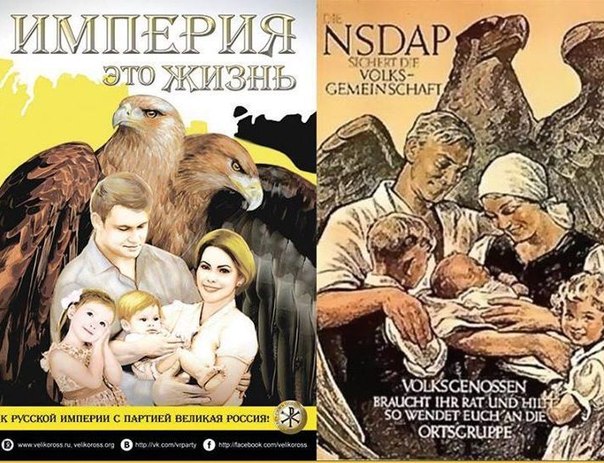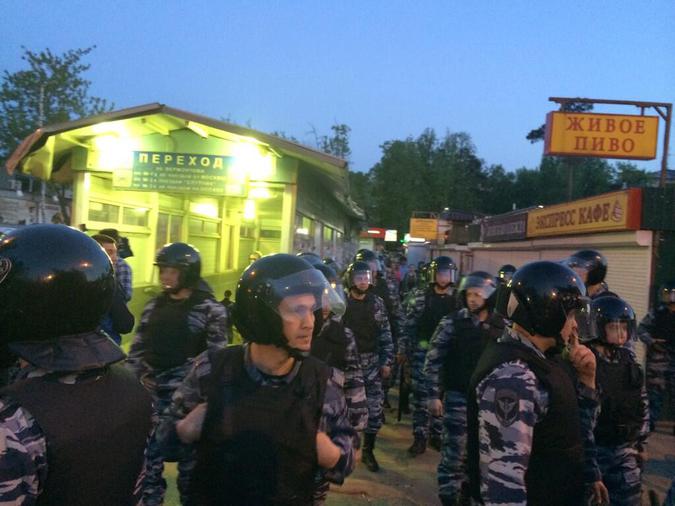Updated Daily. The Chinese-Russian gas deal is getting mixed reviews, depending on what observers think of Putin in the first place. LifeNews reporters are still being held by Ukrainian authorities on charges they helped armed separatists, sparking a debate in the regional journalist community about embedding with insurgents. Russian liberals are concerned that Putin’s aggressive support for the toxic mixture of Russian separatism, mystical ultranationalism and neo-Nazism in southeastern Ukraine will cause blow-back to Russia itself and further fuel nationalist protests against “fifth columnists” as well as anti-migrant rampages.
For last week’s issue on a riots outside Moscow as soccer fans enraged at the murder of a Russian lash out at migrants; threats to block Twitter on the Russian Internet; increasingly aggressive state propaganda against foreigners and dissidents; the pitfalls of measuring public opinion of people dependent on state TV, go here.
For the previous week’s issue on May Day surge of patriotism; Pussy Riot’s trip to Washington to lobby for additions to the Magnitsky List of sanctions; detentions of demonstrators marking second anniversary of 6 May Bolotnaya Square demonstrations; Putin’s Presidential Human Rights Council critical report on Crimea; and support for a Soviet Re-Union go here.
Please help The Interpreter to continue providing this valuable information service by making a donation towards our costs.
May 24, 2014
1242 GMT: Memorial Human Rights Center unsuccessfully challenged the Russian government’s designation of “foreign agent” in a court hearing on 23 May 2014, the organization reported on its web site. Memorial will now take its legal fight to a higher court. The designation had been issued by the prosecutor’s office on 29 April 2013, and the rights group, which monitors human rights violations in Russia and the Eurasian region, was ordered to register as a “foreign agent” under a law ordained by President Vladimir Putin in 2012. The law was put into effect after non-governmental groups were found to be critical of the fraudulent elections and media suppression by which Putin came to power, and began to stage large street protests.
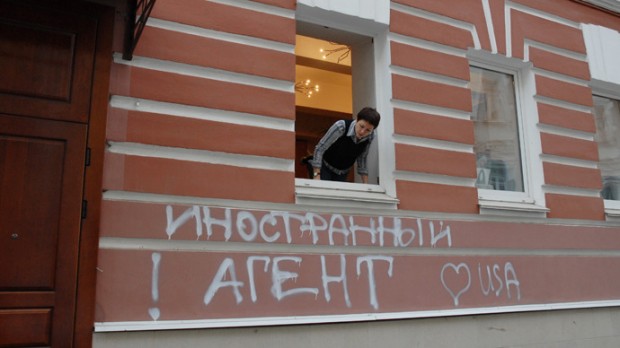
Graffiti “Foreign Agent” scrawled on Memorial building in Moscow. Photo by RIA Novosti/Yulia Klimova
Under the law, NGOs engaged in vaguely-defined “political activity” who receive grants from foreign foundations and donors must register with the Ministry of Justice.
During the hearing, Memorial’s lawyer Kirill Koroteyev and expert witness Furkat Tishayev were unable to determine exactly what “political activity” the group had engaged in. The charges stemmed from claims about an article on another organization’s website, OVD-Info, which monitors police abuse but which Memorial said was incorrectly portrayed in court. The prosecutor also referenced “the European Court of the United Nations” — although he obviously meant the European Court of Human Rights. The Interpreter has translated an excerpt of the news release:
“In its presentation, the prosecutor’s office of Moscow deemed the Memorial Human Rights Center’s political activity to be an article on the ovdinfo.org site and also participation by Serge Davidis, a member of the board of the Memorial Human Rights Center, and a member of the politbureau of the Solidarity Movement, in organizing public actions. Grigory Okhotin, interrogated at the plaintiff’s request, a member of the OVD-info group, reported that Memorial Human Rights Center did not take part in the editorial work of the site. Sergei Davidis, another witness for the plaintiff said that he took part in the actions in his personal capacity, and his activity within the framework of the Solidarity movement was not related in any way to Memorial Human Rights Center.”
In the end, despite many mistakes and inaccuracies, in the view of Memorial, the judge declined their petition to cancel the prosecutor’s order.
Commenting on the ruling, Aleksandr Cherkasov, chairman of the board of Memorial Human Rights Center, said:
“‘First, we do not intend to register in the capacity of a ‘foreign agent.’
Second, we will continue to work.
Third, we will defend by all legal means not only other people’s rights, but our own. We will appeal the decision of the Azmoskvoretsky Court to a higher counrt.
Our complain is filed at the European Court of Human Rights.
Life goes on.'”
As Grigory Okhotin has endeavored to explain in greater detail Memorial Human Rights Center (the human rights arm of a larger family organizations which include International Memorial and Memorial Research Center and various local chapters) has not been finally declared a “foreign agent” because the prosecutor alone cannot decide it. He has called for this designation on the basis of his investigations; Memorial has challenged it in court in a series of hearings over a year; their petition to overturn the order has been denied, but they are appealing it. Only if that appeal to a higher court fails, and they are then ordered finally to register with the Ministry of Justice, would they then have a final designation.
St. Petersburg’s chapter of Memorial, which was registered as a separate entity, was already designated as a “foreign agent” and lost its appeal.
0952 GMT: Andrei Mironov, a well-known translator and human rights advocate from Moscow, has been confirmed as killed in Slavyansk by colleagues. News reports yesterday said that Italian photo-journalist Andrea Roccheli, 30, who worked for the photo agency Cesuralab, was killed outside of Slavyansk in a shelling during a firefight between Russian-backed separatists and Ukrainian forces. With him was his interpreter, Andrei Mironov.
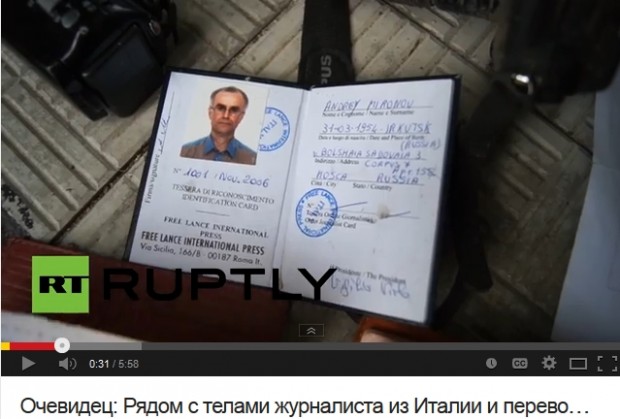
Press pass of Andrei Mironov displayed by Russian separatists at the morgue in Slavyansk. Screenshot from Ruptly video.
Mironov was well known among foreign correspondents in Moscow for many years, since the days of the Chechen wars, as a “fixer,” as the journalistic term has it — or translator/reporter/researcher/office manager/ serving a variety of jobs locally, from cutting through bureaucratic red-tape with officials; to lining up reluctant sources; to essentially serving as assistant producer for photographers or film crews trying to get access under difficult circumstances.
Mironov, a member of Memorial Society, the leading human rights group, was active in events devoted to promoting human rights in Moscow at the Sakharov Center and also took part in some protests. Yesterday, Memorial was ruled “a foreign agent” by a Moscow court under Putin’s draconian new anti-NGO law and ordered to register with the Ministry of Justice with this status or face closure.
The independent web site grani.ru, which was blocked by Roskomnadzor, the Russian censor but is still read on mirror sites and with circumvention tools, had the story of the journalists’ killing. The Interpreter has provided a translation:
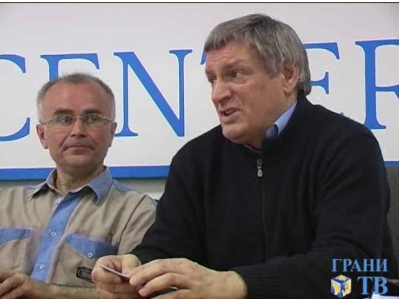
Andrei Mironov (L), translating for another Italian journalist in 2009 at the Sakharov Center in Moscow. Screen shot from Grani.ru video.
“In the village of Andreyevka near Slavyansk, Italian photo-journalist Andrea Rocchelli and his translator Andrei Mironov were killed, RIA Novosti reported. French stringer William Roguelon from Wostok Press was wounded.
Le Monde reports, based on Roguelon s account that Saturday evening, the journalists, Mironov and their driver fell under mortar fire. They got out of the car and lay down on the shoulder of the road. About 40-60 shells fell, says Roguelon. One of the mortars exploded right in the shoulder. Roguelon suffered shrapnel wounds to the legs. His colleagues lay motionless.
Roguelon ran under fire to the position of the separatists, waving his camera and shouting that he was a journalist. He was put in a car and sent to a hospital, where he received medical assistance.
Rocchelli was 30 years old, a member of the Cesuralab photo reporting agency. This is the first case of a death of a journalist in the war in Donbass.
According to Grani’s information, Andrei Mironov is a human rights activist, a Memorial worker, and a former Soviet-era political prisoner. He worked in Chechnya and investigated the use of various types of weapons. Mironov was a constant participant in protest rallies, including Strategy-31. Starting in 2011, he actively took part in the movement in Moscow to preserve historic buildings as well.
Mironov was fluent in English, Italian and other foreign languages. He was jailed for distributing samizdat in the Soviet period. Later he worked with the human rights movement in both wars in Chechnya, documenting violations of the Russian military, but also trying to get Chechen rebels to renounce terrorism.
Pavel Shekhtman, a civic activist, recalled Mironov’s comment about Chechnya:
“‘You can always come to an agreement with an honest person, even if he is an enemy, but you shouldn’t have anything to do with a bastard, even if he is like-minded. I was able to reach agreement with [Chechen terrorist Shamil] Basayev and worked with him. But I worked with him on mine-removal, not on mining.’
I recall how he loved to tell the story how he tried to prove to Basayev that he was a terrorist. ‘But you are a terrorist, Shamil,’ he would say. “No, I’m not a terrorist!’ But how can you not be a terrorist, when…” And in the end, forced him to concede it.”
Rocchelli and Mironov’s last dispatch from Slavyansk had interviews with families who were forced to hide in cellars due to fighting.
Very sad news about Italian journalist and Russian interpreter killed in Ukraine
— Alice Lagnado (@AliceLagnado) May 24, 2014
Andrei Mironov, translator killed in Ukraine, was member of Memorial& ex-polit.prisoner. Helped me&many working in Russia on Chechen war etc
— Alice Lagnado (@AliceLagnado) May 25, 2014
How sad that a former Soviet political prisoner who'd been thru so much -and such a gentle soul – has died in Ukraine…
— Alice Lagnado (@AliceLagnado) May 25, 2014
May 22, 2014
1144 GMT: Opposition members Ilya Yashin and Boris Nemtsov are testifying at the trial of two defendants in the Bolotnaya Square case today in Moscow:
Свидетель Борис Ефимович Немцов. Принимал участие в гражданском марше за честную воасть, за честные выборы. 6 мая 2012 г. #БолотноеДело2
— Сергей Шавшуков (@slvovich59) May 22, 2014
Translation: Witness Boris Yefimovich Nemtsov. Took part in a civic march for an honest government, and honest elections. 6 May 2012. #БолотноеДело2
"Источник моей осведомленности – мои глаза и уши!" @IlyaYashin
Это надо заносить в цитатник, конечно.
#Болотноедело2
— АлексейБескоровайный (@AlexeyB_Kurkino) May 22, 2014
Translation: @AlexeyB-Kurkino “Source of my informedness — my eyes and ears! This should be included in a quotation book, of course. #БолотноеДело2
1100 GMT: The trial of two Bolotnaya Square defendants, Sergei Udaltsov and Leonid Razvozzhayev, charged with inciting riots in the 6 May 2012 rally against Putin’s fraudulent re-election, continues. Opposition member Ilya Yashin has been reporting from the court house where he himself gave testimony, then bumped into a prosecutor for a conversation from Dostoyevsky:
Прокурор в буфете:
"Ну что, замучили вас?"
"Это Развозжаева замучили", – говорю.
"Да ладно, он в хорошей компании сидит. С мэром Ярославля".
— Илья Яшин (@IlyaYashin) May 22, 2014
Translation: @IlyaYashin Prosecutor in the cafeteria: “Well, what, did we torture you totally?” “It’s Razvozzhayev you have tortured,” I said. “Oh, come on, he’s in good company in jail. He’s with the mayor of Yaroslavl.”.
(See The Interpreter‘s report on the arrest of Yaroslavl Mayor Yevgeny Urlashov.)
Три с половиной часа судья пытал меня вопросами по делу Удальцова-Развозжаева. Крайне агрессивный стиль допроса. #болотноедело2
— Илья Яшин (@IlyaYashin) May 22, 2014
Translation: @IlyaYashin For three and a half hours, the judge tortured me with questions on the case of Udaltsov-Razvozzhayev. Extremely aggressive style of interrogation. #болотноедело2
Иду на суд по делу Удальцова-Развозжаева. #болотноедело2 pic.twitter.com/T6tE5UkRhY
— Илья Яшин (@IlyaYashin) May 22, 2014
Translation: @IlyaYashin I am on my way to the trial of Udaltsov-Razvozzhayev. [Bolotnaya Case] #болотноедело2
The trial has been under way for 41 days, reports the defendants’ support site 6may.org
1044 GMT: While reports have said a whole building is affected, from the looks of this amateur video uploaded to Mobile Reporter by a Muscovite, only part of the building was affected:
The US Embassy confirmed that one citizen has been injured and evacuated by a helicopter, vesti.ru reported. Thus out of 4 injured, two suffered serious burns and traumas and were hospitalized and two were treated at the scene.
The residential building also has offices, including a clinic, some bars and stores, a family assistance center, and the officies of Al Jazeera International.
По уточненной информации на Кутузовском просп., д.14 произошел взрыв на 3 этаже 9-этажного дома. По предв. данным 1 человек пострадал.
— МЧС МОСКВЫ (@emercom_press) May 22, 2014
Translation: @emercom_press [Emergencies Ministry Press Office] Further information on Kutuzovsky Avenue, no. 14, an explosion occurred on the 3rd floor of a 9-storey building. From preliminary information, 1 injured.
Взрыв бытового газа произошёл в жилом доме на Кутузовском проспекте, где живут сотрудники американского посольства http://t.co/TwTCO0UdwX
— Новости Эхо Москвы (@EchoMskNews) May 22, 2014
Translation: @EchoMsNews An ordinary gas explosion occurred in a residential building on Kutuzovsky Avenue, where employees of the American Embassy live.
1035 GMT: The Russian news site Vesti says an entire apartment building has blown up in Moscow, and four people are injured. Here’s a video from the scene:
1023 GMT: There are reports of an explosion in apartment buildings in Moscow. We are checking them out. Here’s a translation by The Interpreter of a Muscovite’s tweet:
Взрыв на Кутузовском в доме сотрудников посольства США. Разворочено неск. квартир. Пострадала гражданка США. Официально говорят, что газ.
— Олег Пшеничный (@OlegPshenichny) May 22, 2014
Translation: @OlegPshenichny Explosion on Kutuzovsky Avenue in a building of employees of the US Embassy. Several apartments are affected. A female US citizen has been injured. Officially, they are saying it is gas.
0722 GMT: Depending on your politics or proximity to the Kremlin, you will see yesterday’s gas deal between China and Russia — finally clinched — in different ways. Putin was looking stricken in Shanghai when it seemed as if the deal wasn’t going through; then after his negotiation team “was squeezed out like a lemon,” as a source told Vedomosti, and some concessions were made, finally an agreement of sorts was nailed down — with still questions to be answered. All gas agreements are like that — the devil is in the sub-committees.
Foreign Policy’s Keith John wrote:
“People close to the negotiations said that China had agreed to pay about $350 per thousand cubic meters, which is less than the roughly $380 per thousand cubic meters that Russia’s Gazprom charges most customers in Europe. As the Chinese market develops, it will offer Russia an alternative source of export revenues to complement its European business, which will make it more difficult for European countries to strike back at Moscow by reducing the amount of energy they buy. In the wake of Russia’s annexation of the Crimean peninsula, the United States and the EU have sought to take advantage of Moscow’s dependence on energy exports, which account for about half of Russia’s federal revenue.”
That was a strange way of putting it, simply because the problem has never been that Europe has been able to “strike back” at Moscow — it’s the other way around. It takes Polish Prime Minister Tusk to make that point…
Polish @PremierTusk presents #EnergyUnion for Europe, says "energy dependency makes it difficult for us to react fast enough against Russia"
— Fred Kempe (@FredKempe) May 21, 2014
… and also Ariel Cohen of the conservative Heritage Foundation, in the Wall Street Journal:
“Today, the Old Continent brings 30% of their gas imports from Russia. But Central and Eastern European countries, from Bulgaria to Ukraine, are dependent on Russian gas for over 70% of their total gas consumption. That means, with literally a push of a button in Moscow, these countries can become dark and cold. In fact, this already happened in 2009 and may occur again.
So the EU fought back by promoting the Third Energy basket, which prohibits geographic destination of the molecules sold by Gazprom. The Basket also pushes back on gas production companies’ ownership of distribution networks, and promotes antimonopoly legislation.
However, the salvation will come from three directions: liquefied natural gas (LNG), the new sources of gas, and interconnectors. LNG is becoming competitive in the European markets, as suppliers from Qatar, Algeria, Nigeria and elsewhere smell the blood and are trying to claw away at the Russian market share.”
The salvation might take quite a while coming from these places and there is a growing anti-fracking movement in the West, supported by Russia, of course.
Gazeta.ru and some other news sites provided the figure of “$400 billion” for the 30-year contract to sell “up to” 38 billion cubic meters (bcm) per year. To put it in context, that seems to work out to about China buys from Turkmenistan a year, which has the fourth-largest gas fields in the world, but less than what Russia was trying to buy from Turkmenistan (50 bcm) before politics and a pipeline explosion scuttled the deal.
Most of the Russian state media reported this in an upbeat fashion, quoting Alexey Miller, CEO of Gazprom, saying “this is like no other major gas contract with any country anywhere” although the price is “a commercial secret”. Gazeta.ru put the price at $350 per 1,000 cubic meters which they described as “close to” the European price; in fact, the European price is $380, and Vedomosti said the price for the Chinese might be $387.
So now let’s look at Vedomosti, one of the more independent papers, where “a source close to one of the sides of the negotiations” (we bet they speak Russian!) says (translation by The Interpreter):
“These figures are ‘only the maximum, but the price of the contract is calculated proceeding from the minimum volume on the principle of ‘take or pay. What obligations China has for its minimal take, he did not say.
Under this contract, the Siberian Power gas pipeline is supposed to be built, but only 4-6 years after deliveries start. The 38 billion cubic meters will be delivered in five years, says a person close to one side of the negotiations, that is, for the first five years, Gazprom must deliver to China through the Siberian Power line up to 82 billion cubic meters, or on average, 16.4 billion cubic meters per year.”
Neither Gazprom or the Chinese National Petroleum Company have made public comments.
Vedomosti also stresses the question of whether China will pay an advance on this deal, which Russian Energy Minister Aleksandr Novak said “may” be “up to $25 billion.” It has been left to the Chinese to decide.
‘The Russian media are presenting the Chinese Gazprom contract as a significant event, however the fact that the price isn’t named places this thesis under doubt,’ says political analyst Mikhail Vinogradov. ‘In the West, this contract is being perceived rather as a forced concession to China, and not proof that Russia has acquired a full-fledged partner in the East.”
Where, in that West? Not in the New York Times, anyway, which sees the deal as proof that Russia and China have been able to get back together after the US and EU rebuffed Putin over Ukraine.
“’The Sino-Soviet rift that brought the two countries to the brink of nuclear war in the ’60s has been healed rather dramatically,’ said Strobe Talbott, president of the Brookings Institution and the chairman of Secretary of State John Kerry’s Foreign Policy Advisory Board.”
Russian analysts see it differently, says Vedomosti:
“‘This deal has two aspects: political and economic. In the political sense, the contract is a success, Gazprom risked being late to access of the Chinese market, and in light of the Ukrainian risks and the position of Europe regarding diversification of deliveries, it’s simply essential,’ says Grigory Vygon, director of the energy center at the Skolkovo Business School. ‘But from the perspective of economics, with a price lower than $450, the profitability of the project could turn out to be negative.'”
As opposition figure Vladimir Milov points out at slon.ru, China’s consumption of gas is only 5% of its energy market because it relies on domestically-produced coal. The need not to rely on imports outweighs environmental concerns, and we could add, it’s not as if a Western-style environmental movement threatens Beijing any time soon. Milov sees the deal as a “painful lesson” for Putin and contrasts the current concessions with those in the 1990s, when nationalists fumed but at least some profit came from it. Now, says Milov:
“We have already taken a loan of $25 billion for the oil deal, which exceeds the amount of borrowing Russia made from the IMF in the 1990s, and now this sum will at a minimum double. Well, and when we really have been forced to our knees?
Putin indirectly confirmed the lack of profit from the Chinese gas deal, when he offered to nullify the tax on gas delivered to Chinese. In brief, for those who did not get it yet: the budget will not receive anything at all from the export to China.”
So whether there’s cause for celebration, as ITAR-TASS proclaims, or Putin is stricken, as at first his own court photographers unwittingly portrayed him, or striding away triumphantly, as the New York Times chose to show him, or looking rueful, as slon.ru depicted him, time will tell.
May 21, 2014
0936 GMT: In a rebuttal of the charges in the last day that their reporters seem to be cheering and directing Russian-backed separatists in south-east Ukraine, LifeNews claimed that their video was being portrayed falsely by Ukrainian journalists and bloggers. They said the voice in the video does not match the voice of either of their kidnapped reporter. LifeNews — which has run wild tales such as “Right Sector looting towns” and “hundreds if not a thousand Right Sector fighters” bused into Mariupol — now hopes it will be believed on this story.
In an article today on its website, LifeNews refutes Ukrainian journalist Aleksandr Gorobets, who posted a story on Ekho Moskvy yesterday titled, “What in Reality are LifeNews Employees Doing Outside of Kramatorsk? Video Evidence.” He charges the pro-Kremlin reporters not only with “assisting terrorists” — as the Ukrainian Security Service (SBU) has done, but also accused them of actually commanded the separatist “self-defense”.
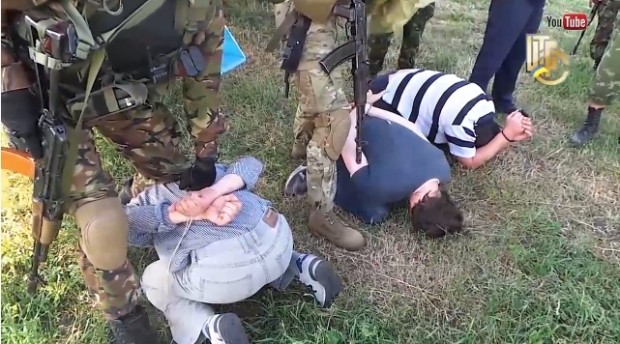
Screenshot from video obtained by Ukrainian journalists published by LifeNews purporting to show Ukrainian National Guard capturing LifeNews journaliss Olega Sidyakin and Marat Saychenko outside Kramatorsk on 18 May 2014
LifeNews pointed out that they had uploaded the video showing shooting near the village of Cherevkovka, between Slavyansk and Kramatorsk, on 19 May for a news story.
At that time, without citing any names of reporters, they wrote that the firefight lasted 40 minutes, and there were no casualties in that particular battle. They described the fighters as “a mobile group of self-defense” which had tried to take the checkpoint in Cherevkovka. Now they claim that the video was taken by the fighters themselves and LifeNews got it from them:
“Our journalists received this video from representatives of the militia, who battled soldiers from the National Guard near the checkpoint at the village of Cherevokovka, which is between Slavyansk and Kramatorsk.”
The only problem with that story is that their article posted 18 May doesn’t clearly establish this provenance, and there is no original separatists’ video without LifeNews’ logo on YouTube as far as is known. LifeNews say they routinely make use of citizens’ videos from dash cams and cell phones and also accept videos from fighters themselves in preparing their broadcasts.
To bolster their story, LifeNews cites Aleksandr Kots, a special correspondent from the pro-government Komsomolskaya Pravda covering the fighting in the region (and, we could add, reportedly one of the 300 journalists on a secret Kremlin list who were given special awards for their coverage of the Crimea annexation). Kots says he even knows the name of the separatist who took the video.
“The man who took this periodically shares his videos with us. He does not ask for money for this. He just wants for people to see what is happening in reality in the south east of Ukraine. This video was taken outside of Slavyansk. It was filmed by the commander of one of the units of the rapid-response group. I don’t know his name, but I know his handle — Motorola,’ says journalist Aleksandr Kots. ‘He’s this sturdy, cheerful guy. He has filmed a lot himself, he both commands and shoots videos. For example, he gave us a videotape of the night shelling of Kramatorsk.”
In a special broadcast about the disputed film, LifeNews also complains about the time-stamping issue, where California time-stamps on YouTube videos can make them appear as if they were made before events happened on another time zone, a feature which led some to accuse LifeNews of staging a battle outside a feed plant before it took place.
More research is needed to verify these claims, but no doubt we’ll be seeing an interview with a separatist named “Motorola” soon from LifeNews.
Meanwhile, the dispute has caused more fall-out, as Arom Ashotich, CEO of newsmedia.ru, the owner of LifeNews, has denounced Alexey Venediktov, editor-in-chief of Ekho Moskvy:
Я хочу сказать Венедиктову и всему "Эху" – вы просто подлые люди и провокаторы. http://t.co/H1JFzqH5aD
— АрамАшотыч (@AramAshotich) May 21, 2014
Translation: I want to say to Venediktov and everyone at Ekho: you are simply bad people and provocateurs.
In an article on the dispute, the independent news site slon.ru said Ekho Moskvy does not coordinate bloggers like Gorbonets, but soon after Komsomolskaya Pravda correspondent Kots published his refutation of the claim about the “stage-managed” battle scene on Ekho Moskvy where readers are debating both posts.
0803 GMT: Over on our Ukrainian LiveBlog, we covered the detention in Slavyansk on 18 May of two LifeNews Russian journalists, Marat Saychenko and Oleg Sidyakin, by Ukrainian security authorities. LifeNews is a popular “reality” TV station said to be close to Kremlin intelligence which has provided some of the most lurid and propagandistic coverage of the war. VICE News correspondent Simon Ostrovsky, himself held captive by Russian-backed separatists for a time, summed it up best:
Ukraine, release the @lifenews_ru reporters you detained. Russia, free Ukrainian filmmaker Oleg Sentsov. Lifenews, stop faking news. Deal?
— Simon Ostrovsky (@SimonOstrovsky) May 19, 2014
Taking a page out of the book #BringBackOurGirls to save the Nigerian girls kidnapped by Boko Haram, LifeNews has created a hashtag campaign #SaveOurGuys.
Most of the users in the top tweets with the hashtag seem to be the Russian Foreign Ministry and various officials, as well as figures like the conservative Duma member Robert Shlegel. The promotion of the LifeNews case, without mention of the many other journalists in the region still being held by separatists (or missing) has grated on some, along with the refusal of LifeNews to address the weapons charge:
Wow Russian foreign ministry wants some selfie attention @mfa_russia: #SaveOurGuys pic.twitter.com/zv51sU4lp4”
— Ben Judah (@b_judah) May 20, 2014
Russian media is yelping about the detained @lifenews_ru journos. Like the MANPAD found w/ the crew's 'friends', is no biggie. #SaveOurGuys
— WeAreUkraine (@WeAreUkraine) May 20, 2014
Even so, there were claims that thousands of ordinary Russians were taking part in this English-language hashtag campaign:
#SaveOurGuys: 1000s take part in twitter campaign to release detained journalists. #US echoes #Kiev claims that reporters aided terrorists.
— rui borges (@homo_viator) May 21, 2014
There did seem to be about 4,000 reported today, then usage sharply dropped to the hundreds, according to the analytical tool hashtag.org:
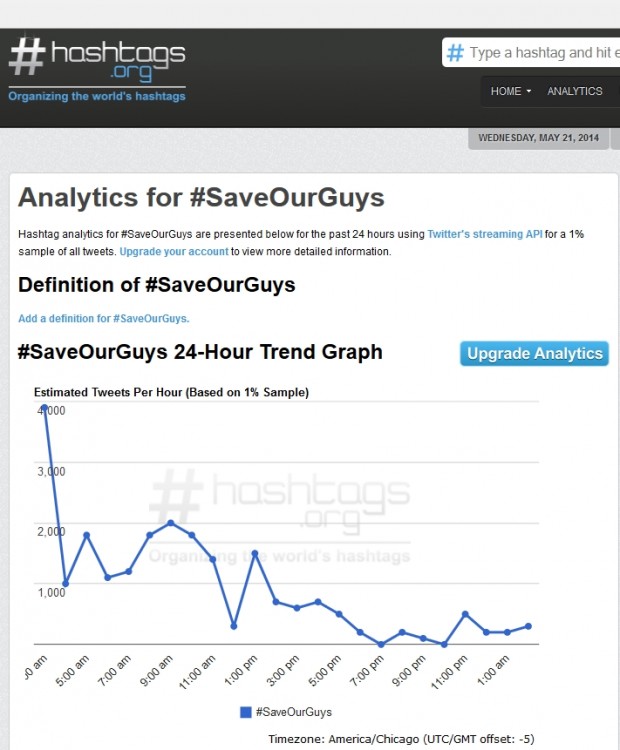
Some Twitter users said the term was in the top trends for Russia today, and one developer in Toronto said it was in Ukraine’s top trend:
Хэштег #SaveOurGuys вышел на первое место в топе украинского Twitter
— Jacob (@lybee7aq) May 21, 2014
When we looked just now, we didn’t see #SaveOurGuys in Moscow’s top trends, but actually the word “Magnitsky” in the top trending topics, related to the announcement of US sanctions earlier.
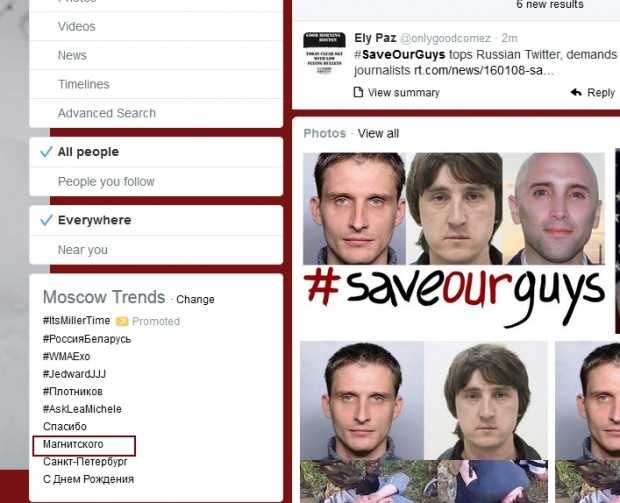
And in Kiev’s top trends, “LifeNews” but not #SaveOurGuys was in the top trending topics:
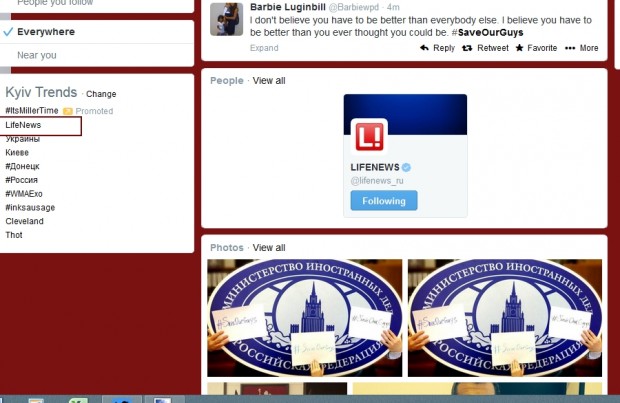
War correspondent Arkady Babchenko, who fought for the Russian Army in the Chechen and other wars, but who was supportive of EuroMaidan and has covered the Crimean war critically, had some thoughtful points to make at the independent news site snob.ru about the issues surrounding the detention of the LifeNews reporters, which also apply to RT.com stringer Graham Philips, who is also being held evidently on espionage charges.
It is accepted practice for war correspondents to embed with combatants and to cover wars from both sides, says Babchenko. What if the LifeNews reporters merely rode with separatists in their car, and the MANPADS said to be found with the journalists were in the separatists’ trunk? If their coverage of battles is seen as “revealing the position of the Ukrainian army,” how can any reporter cover the war freely and what will this say about the rights of all journalists? Ukrainian officials have not yet provided details to support their initial charges that the two journalists, in addition to carrying credentials from the “Donetsk People’s Republic,” which Kiev does not recognize as valid, were found with weapons.
“Covering gunfire from anybody at anybody — that is exactly what the professional activity of a journalist is in a war,” says Babchenko. “Moreover, there shouldn’t be any difference on whose side he is working.”
Babchenko is troubled by the wording used by the Ukrainian government in justifying the detention; the two reporters are suspected “of facilitating terrorism through information accompaniment.”
“The Russians are ‘accompanying the terrorist groups, filming their attacks on Ukrainian soldiers and de-facto are part of the terrorist groups.’
Forgive me, that’s stupid. What else should journalists do in a war if not film attacks, shelling, ambushes and battles?
Including even from the side that someone doesn’t like, no matter who.
And the formulation ‘facilitating terrorism through information support’…Frankly, I didn’t think that after Maidan, such formulations were possible. ‘Information accompaniment of terrorism’ is not post-revolution Ukraine. It’s Putin’s Russia.”
Babchenko’s piece was likely written before a video purporting to show LifeNews embedded with separatists began to be distributed. We cannot vouch for its veracity. The film purports to show LifeNews’ usual logo, and shows fighters attacking the position of Ukrainian soldiers. But what many on social media have found damning about it — and which supports the Ukrainian government’s position — is that the narrator of the video seems to be egging on the fighters. He tells them to move their fire more to the left, in order to be sure to hit someone who seems to be hiding in the bushes. He not only cheers them, but directs them in the film.
News aggregators and analysts like Information Resistance supporting the Kiev government repeatedly tell users engaged in citizen journalism not to reveal the positions of the Ukrainian army as this aids the enemy. They are largely ignored, as people continue to shoot videos on their phones and upload them heedless of whatever use either side in the conflict may make of it.
May 20, 2014
2331 GMT: The Russian independent press — what remains of it — has had to get more clever about criticizing the authorities these days. So the business daily Kommersant has a funny online test, “Have You Mastered Diplomatic Russian?” which pokes fun at the outrageously tendentious cliches used by Foreign Minister Sergei Lavrov and other Russian diplomats. Here is a sample of some of the questions on the test, translated by The Interpreter — see if you can fill in the blank with the correct answer:
“1. Instead of forcing [blank] to sit down at the negotiation table with the south east of Ukraine on the future governance of the country, our partners dance to Washington’s tune.
Answer: 1) Kiev clique 2) Ukrainian authorities 3) Yatsenyuk and Turchynov 4) Maidan middlemen
2. The Ukrainian army and special divisions of Right Sector under [blank] of the National Guard continue a criminal operation in the forceful coercion of residents to silent subordination to those who preach nationalism and oppose reform of the bankrupt system of state rule in the country.
Answer: 1) command 2) pretext 3) personal 4) cover
3. The Russian Foreign Ministry expresses its grave concern about the outrageous incidents of arrests of [blank] in the south-east of Ukraine and other facts of violations of human rights by the Kiev regime.
Answer: 1) civic figures 2) civilians 3) pro-Russian separatists 4) Donetsk militia
We confess that we flunked this test twice — it’s tricky! And even after having had a course in Soviet newspaper cliches (they’re back!) and a tip on recent usage from Ela Kolesnikova, the professor who resigned in protest from the prestigious Moscow Institute for International (MGIMO), who wrote on her Facebook page about the increasing use of the Soviet-era term “clique” (here is our translation):
“In the Stalin era, there was a bound phrase, ‘Tito and his clique.’ It became current after a 1948 article, “Where is the Nationalism of the Tito Group in Yugoslavia Leading? It was signed by the Central Committee but apparently Comrade Stalin himself had written it.
By 1956, when Joseph Broz Tito visited the USSR, ‘Tito and his clique’ had already firmly lodged in the minds of the bearers of the great and powerful. Since for many of them, the word ‘clique’ is completely de-semanticized, during this visit, there was a mishap. Tito traveled to Moscow on a train, and at each station, as he approached the capital, the local authorities hung out enormous posters, ‘Welcome, Comrade Tito And His Clique!’
Now that you’ve been given one free answer, see if you can pass this test – in Russian!
2231 GMT: The US Government has added 10 more names to the Magnitsky List of Sanctions, persons suspected of direct involvement in the torture and death in Russian police custody of Sergei Magnitsky as well as others suspected of mass violation of human rights:
ALISOV, Igor Borisovich; DOB 11 Mar 1968 (individual) [MAGNIT].
GAUS, Alexandra Viktorovna (a.k.a. GAUSS, Alexandra); DOB 29 Mar 1975 (individual) [MAGNIT].
KHLEBNIKOV, Vyacheslav Georgievich (a.k.a. KHLEBNIKOV, Viacheslav); DOB 09 Jul 1967 (individual) [MAGNIT].
KLYUEV, Dmitry Vladislavovich (a.k.a. KLYUYEV, Dmitriy); DOB 10 Aug 1967 (individual) [MAGNIT].
KRATOV, Dmitry Borisovich; DOB 16 Jul 1964 (individual) [MAGNIT].
KRECHETOV, Andrei Alexandrovich; DOB 22 Sep 1981 (individual) [MAGNIT].
LITVINOVA, Larisa Anatolievna; DOB 18 Nov 1963 (individual) [MAGNIT].
MARKELOV, Viktor Aleksandrovich; DOB 15 Dec 1967; POB Leninskoye village, Uzgenskiy District, Oshkaya region of the Kirghiz SSR (individual) [MAGNIT].
STEPANOV, Vladlen Yurievich; DOB 17 Jul 1962 (individual) [MAGNIT].
SUGAIPOV, Umar; DOB 17 Apr 1966; POB Chechen Republic, Russia (individual) [MAGNIT].
TAGIYEV, Fikret (a.k.a. TAGIEV, Fikhret Gabdulla Ogly; a.k.a. TAGIYEV, Fikhret); DOB 03 Apr 1962 (individual) [MAGNIT].
VAKHAYEV, Musa; DOB 1964; POB Urus-Martan, Chechen Republic, Russia (individual) [MAGNIT].
Another step to end impunity in Russia in Magnitsky's murder: 10 more people added to Magnitsky list by US gov http://t.co/XtApGb4lT1
— Bill Browder (@Billbrowder) May 20, 2014
Biggest fish on new Magnitsky list is Dmitry Kluyev, head of Kluyev organized crime group. Learn more about him here https://t.co/2M8mFfUg5f
— Bill Browder (@Billbrowder) May 20, 2014
Another new addition to Magnitsky list is Vladlen Stepanov, caught by the Swiss police w/ more than $10m in banks https://t.co/omzJh7qnhW
— Bill Browder (@Billbrowder) May 20, 2014
Good to see Judge Alisov, who made legal history by being first to try and convict a dead man being added to Magnitsky list
— Bill Browder (@Billbrowder) May 20, 2014
Dr's Kratov and Litvinova, who denied Sergei Magnitsky medical attention added to Magnitsky list in US after Putin acquitted them in Russia
— Bill Browder (@Billbrowder) May 20, 2014
One of those now in the sanctions list, Dmitry Klyuev, had personally travelled to a meeting of the Organization of Security and Cooperation in Europe (OSCE) to try to plead his case, and was filmed by the staff of the Congressional Commission on Security and Cooperation in Europe (CSCE), the US delegation to OSCE.
Dmitry Klyuev, now sanctioned by @USTreasury, at 2012 #OSCE session in Monaco #Magnitsky https://t.co/jMTz8uGAis
— Kyle Parker (@kyleparkernet) May 20, 2014
New Magnitsky list wouldn't have happened w/o intervention from Senators: Cardin, McCain, Menendez & Corker. Thank you for your leadership
— Bill Browder (@Billbrowder) May 20, 2014
2000 GMT: President Putin failed to get a gas contract with China despite a personal visit to Shanghai, the business daily Kommersant reported. Even official Kremlin pictures of him in Shanghai show him looking rather forlorn.
But Putin is still trying to get a deal by offering concessions, such as zero taxes on mineral extraction and gas delivery from fields in Eastern Siberia to China, if Beijing will remove VAT for import of Russian gas. “Moscow is counting on Gazprom gaining access to the domestic Chinese market,” said Kommersant.
Igor Sechin, the head of Rosneft and himself often Putin’s chief interlocutor with the Chinese — who is on US sanctions lists in punishment for the Kremlin’s forcible annexation of China — called the proposal “interesting” and said some time lines might be put on it to ensure profitability, said Kommersant. Rosneft itself is trying to get a deal with China for a future Siberian pipeline.
Sechin explained a key reason why Russia and China have failed to reach a major deal for some time; gas prices are subsidized in the domestic market, and thus imported gas is much more expensive.
“The Chinese authorities have plans to liberalize the market and gradually raise the domestic prices, however in any event profits from potential investors in gas distribution, including Gazprom, will directly depend on the stability of the regulation of the industry.”
That hasn’t stopped Ekaterina Trofimova, the first vice president of the board of Gazprombank from enthusing about Russia’s new “Asian pivot” in its economy.
The presidential news service at kremlin.ru had an upbeat if vague statement that “a broad spectrum of issues on the bi-lateral agenda were discussed,” and said the two leaders signed cooperation agreements in the “trade, economics, energy and humanitarian areas” but didn’t mention any gas deal.
MT @tggrove And in other news, #Russia didn't sign gas deal w/ Beijing, despite #Putin's physical presence in #China http://t.co/s0BiyuWXCl
— Nina Ivanovna (@ninaivanovna) May 20, 2014
May 19, 2014
1800 GMT: Recently, there was a cabinet shake-up at the Kremlin, and Russians and Westerners have been struggling to find the meaning of it all — generally concluding that it’s about more control over the restive North Caucasus and control of separatism in light of the Ukrainian adventure.
Andrew Monagham, Senior Research Fellow at the Chatham House Russian and Eurasia Programme has a good, concise summary:
“On 12 May Vladimir Putin appointed a number of senior figures from the security services to positions of strategic importance for Russia. Nikolai Rogozhkin and Sergei Melikov were appointed presidential envoys for the Siberian and North Caucasus federal districts respectively, as well as to the Russian Security Council (as non-permanent members). Other notable appointments include Viktor Zolotov as commander-in-chief of interior ministry troops and first deputy interior minister. Putin also established a new Ministry for North Caucasus Affairs, with Lev Kuznetsov as minister. Viktor Tolokonsky, formerly presidential plenipotentiary to the Siberian Federal District, was made acting governor of Krasnoyarsk in place of Kuznetsov. Appointments were also made to important positions in the interior ministry (MVD).
Russian commentators are divided about the importance of the moves. Some argue that this is little more than a rotation of familiar personnel to imitate a real policy change; others have returned to a long-standing rumour that Zolotov’s appointment may herald the creation of a national guard. Still others take the changes more seriously. Evgeniy Minchenko, a respected commentator on Russian domestic politics, suggests that the appointments of Melikov and Rogozhkin makes them ‘mega-regulators’ on matters of security and corruption, shifting responsibility for social and economic matters to regional governors and government ministries.”
1800 GMT: According to a report by Radio Svoboda, the Russian-language service of RFE/RL, picketers who created a chain along Nevsky Prospect in St. Petersburg to comemmorate the 70th anniversary of Stalin’s deportation of the Crimea Tatars suffered attacks from a neo-Nazi dressed in black in the style of followers of Aleksandr Barkashov. The man ripped the demonstrators’ posters, then stabbed activist Miroslav Romanov, who was hospitalized and is recovering from a stomach wound. Then the attacker set on Konstantin Ershov, the co-chairman of Solidarity, the group organizing the picket, but thanks to intervention by a policeman, the attacker was detained, and continued to chant “Crimea is Ours” at the police station. He was identified as Ruslan Pseush, a native of Gatchina.
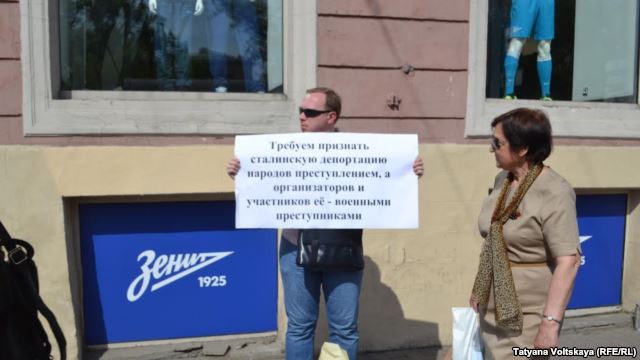
Picket in St. Petersburg to Commemorate 70th Anniversary of Crimean Tatars’ Deportation 18 May 2014. Photo by Tatyana Voltskaya/RFE/RL
A Solidarity demonstrator who gave his name as “Dmitry” told Radio Svoboda (translation by The Interpreter):
“The very fact that a man in a ‘Barkashov’ uniform can stroll along Nevsky and wave a knife around in a crowd, makes a strong impression. I saw all that, and I am simply shaken. We really want our Ukrainian friends, with whom we very much sympathize, to see what is going on here in our country.”
Last week, as we reported on our Ukrainian Liveblog, Ukrainian intelligence intercepted and published a telephone call between Russian neo-Nazi Aleksandr Barkashov, head of the Russian National Unity (RNE) movement, and separatist fighter Dmitry Boitsov.
Alexander Verkhovsky, director of SOVA Center, a Moscow-based organization which monitors extremist movements in Russia, noted that according to Pseush’s VKontakte account, he portrays himself as a Russian volunteer for the separatist cause in Ukraine. His profile has a picture of himself in combat gear and videos of the infamous former GRU colonel Igor Strelkov and describes his plans to go and fight in Donetsk. His page is now filling up with condemnations of his attack along with threats against critics by his supporters.
As Alexander Cherkasov, a member of Memorial Society wrote on his Facebook page, “In general, the cultivation of political violence in the neighborhood cannot help but return to us.”
Social media amplifies incidents like these tremendously, but also amplifies those trying to combat it, such one VK user, Stepan Valentinovich, who published several Internet memes showing the relationship between Nazism and Russian ultranationalism:
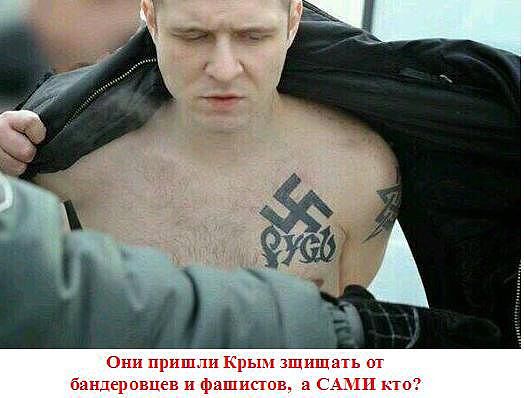
Russian Internet meme: “They came to Crimea to defend us from Banderaites and fascists. But who are THEY?”
1520 GMT: Last week in Pushkino, a suburb of Moscow, soccer fans staged a memorial rally for a Russian youth who was murdered in a fight with migrant workers (see coverage by The Interpreter here). In a revival of the kind of anti-migrant and nationalist sentiments that sparked the riots last year in Biryulevo, protesters surged to the local administration building to complain, but ultimately pushed past local politicians and police chiefs who came to reason with them and surged to construction sites and a marketplace, turning over a migrant’s tomato truck and demolished tent stalls.
OMON [special forces of riot police] were already on hand and made 43 arrests, but then released those who had beaten some migrants and destroyed property the same day. A detachment of OMON guarded a migrant’s dormitory from the mob and eventually the crowds dispersed — for now.
By the next day, authorities in Russia had not only succeeded in working with Uzbek police to capture the suspect, they returned him to Moscow and arrested him at the airport with maximum press coverage. While there were some complaints of excessive police force, many seemed relieved that police had not “stood idly by,” as they have been accused of doing in the past, but reacted with a large display of power widely discussed in social media and local press. Less attention has been given to the many murders of migrants workers, mainly from Central Asis in Moscow each year that go uninvestigated.
The incident immediately touched off concern that a scenario much like the towns in southeastern Ukraine could be in the making, where people suffering economic dislocation channel their grievances through ultranationalist movements that would challenge corrupt or inept local governments — this time in Russia itself. The same ideologues for the xenophobic sentiments of the Russian March and other events notorious for anti-migrant slogans have been eagerly supporting the Russian separatists in Ukraine — with the Kremlin amplifying their appeal by featuring the separatist heroes endlessly on its various propaganda outlets at home and abroad.
As Paul Goble has noted in Windows on Eurasia, citing Gazeta, a single spark could start pogroms again:
“The export of ‘the Russian spring’ to Ukraine was very profitable for the Russian authorities,” the paper says. “But the import of ‘the Russian spring’ back into Russia could harm Russia itself.” Moreover, “the import of pogroms is possible also because there already exists in Russia an officially articulated demand for a struggle against internal enemies.”
